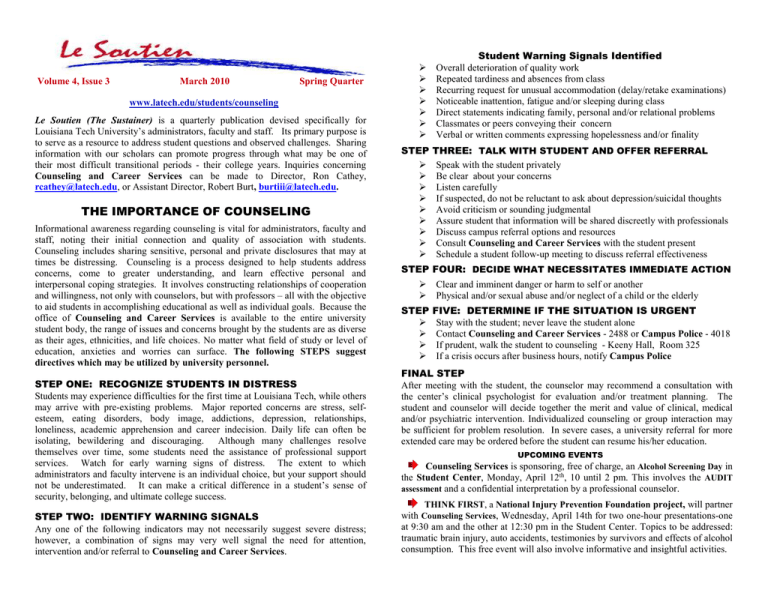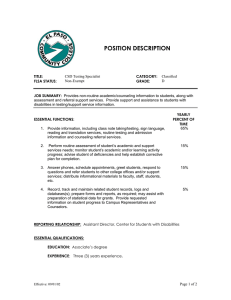Document 15999744
advertisement

Volume 4, Issue 3 March 2010 Spring Quarter www.latech.edu/students/counseling Le Soutien (The Sustainer) is a quarterly publication devised specifically for Louisiana Tech University’s administrators, faculty and staff. Its primary purpose is to serve as a resource to address student questions and observed challenges. Sharing information with our scholars can promote progress through what may be one of their most difficult transitional periods - their college years. Inquiries concerning Counseling and Career Services can be made to Director, Ron Cathey, rcathey@latech.edu, or Assistant Director, Robert Burt, burtiii@latech.edu. THE IMPORTANCE OF COUNSELING Informational awareness regarding counseling is vital for administrators, faculty and staff, noting their initial connection and quality of association with students. Counseling includes sharing sensitive, personal and private disclosures that may at times be distressing. Counseling is a process designed to help students address concerns, come to greater understanding, and learn effective personal and interpersonal coping strategies. It involves constructing relationships of cooperation and willingness, not only with counselors, but with professors – all with the objective to aid students in accomplishing educational as well as individual goals. Because the office of Counseling and Career Services is available to the entire university student body, the range of issues and concerns brought by the students are as diverse as their ages, ethnicities, and life choices. No matter what field of study or level of education, anxieties and worries can surface. The following STEPS suggest directives which may be utilized by university personnel. STEP ONE: RECOGNIZE STUDENTS IN DISTRESS Students may experience difficulties for the first time at Louisiana Tech, while others may arrive with pre-existing problems. Major reported concerns are stress, selfesteem, eating disorders, body image, addictions, depression, relationships, loneliness, academic apprehension and career indecision. Daily life can often be isolating, bewildering and discouraging. Although many challenges resolve themselves over time, some students need the assistance of professional support services. Watch for early warning signs of distress. The extent to which administrators and faculty intervene is an individual choice, but your support should not be underestimated. It can make a critical difference in a student’s sense of security, belonging, and ultimate college success. STEP TWO: IDENTIFY WARNING SIGNALS Any one of the following indicators may not necessarily suggest severe distress; however, a combination of signs may very well signal the need for attention, intervention and/or referral to Counseling and Career Services. Student Warning Signals Identified Overall deterioration of quality work Repeated tardiness and absences from class Recurring request for unusual accommodation (delay/retake examinations) Noticeable inattention, fatigue and/or sleeping during class Direct statements indicating family, personal and/or relational problems Classmates or peers conveying their concern Verbal or written comments expressing hopelessness and/or finality STEP THREE: TALK WITH STUDENT AND OFFER REFERRAL Speak with the student privately Be clear about your concerns Listen carefully If suspected, do not be reluctant to ask about depression/suicidal thoughts Avoid criticism or sounding judgmental Assure student that information will be shared discreetly with professionals Discuss campus referral options and resources Consult Counseling and Career Services with the student present Schedule a student follow-up meeting to discuss referral effectiveness STEP FOUR: DECIDE WHAT NECESSITATES IMMEDIATE ACTION STEP Clear and imminent danger or harm to self or another Physical and/or sexual abuse and/or neglect of a child or the elderly FIVE: DETERMINE IF THE SITUATION IS URGENT Stay with the student; never leave the student alone Contact Counseling and Career Services - 2488 or Campus Police - 4018 If prudent, walk the student to counseling - Keeny Hall, Room 325 If a crisis occurs after business hours, notify Campus Police FINAL STEP After meeting with the student, the counselor may recommend a consultation with the center’s clinical psychologist for evaluation and/or treatment planning. The student and counselor will decide together the merit and value of clinical, medical and/or psychiatric intervention. Individualized counseling or group interaction may be sufficient for problem resolution. In severe cases, a university referral for more extended care may be ordered before the student can resume his/her education. UPCOMING EVENTS Counseling Services is sponsoring, free of charge, an Alcohol Screening Day in the Student Center, Monday, April 12th, 10 until 2 pm. This involves the AUDIT assessment and a confidential interpretation by a professional counselor. THINK FIRST, a National Injury Prevention Foundation project, will partner with Counseling Services, Wednesday, April 14th for two one-hour presentations-one at 9:30 am and the other at 12:30 pm in the Student Center. Topics to be addressed: traumatic brain injury, auto accidents, testimonies by survivors and effects of alcohol consumption. This free event will also involve informative and insightful activities.
